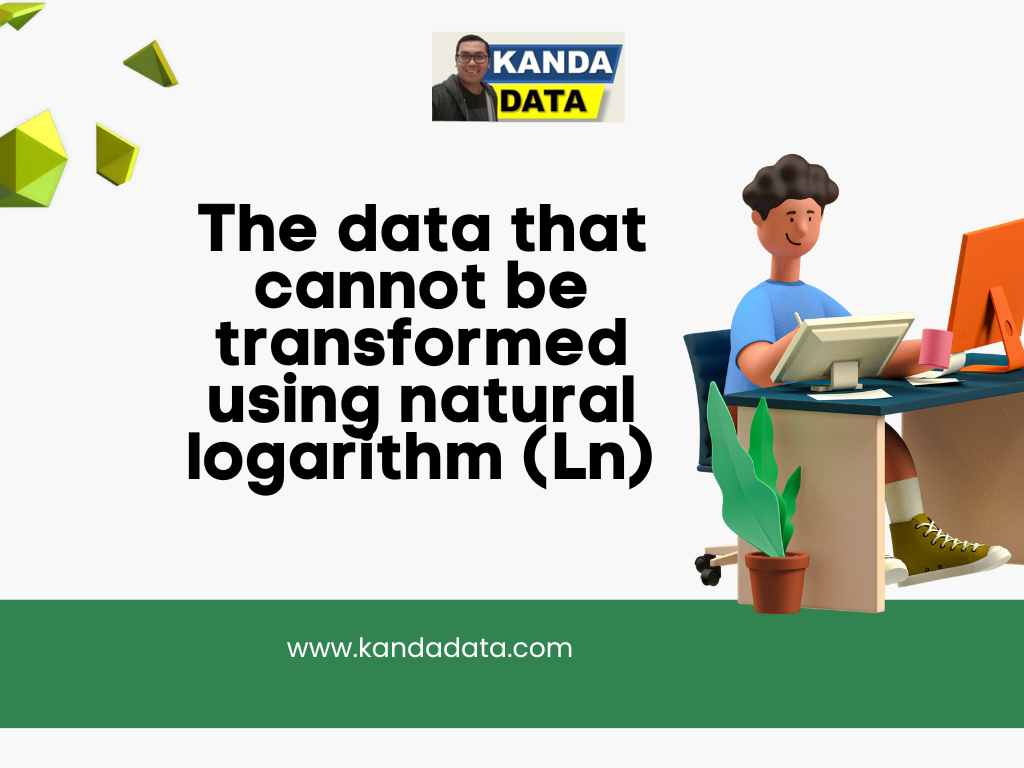Blog
The data that cannot be transformed using natural logarithm (Ln)
In quantitative data analysis, to ensure unbiased and consistent estimations, it’s important to meet several assumptions required in the conducted tests. However, sometimes, the test results may not meet the desired expectations.
To address this, researchers can take several steps and approaches to ensure that the assumptions of the chosen quantitative tests are met. One strategy that can be used is data transformation.
One common type of transformation performed by researchers is using natural logarithm. However, it should be noted that not all types of data are suitable for transformation using natural logarithm.
When considering data transformation, it’s important to be aware that not all types of data are suitable for natural logarithm transformation. In this instance, I will discuss the types of data that are not recommended for transformation using natural logarithm.
In the previous context, the concept of natural logarithm was described as one of various data transformation methods available. However, besides natural logarithm, there are various other forms of transformation that can be used.
Data transformation refers to the process of changing original data into another format for a specific purpose. This process is generally done to improve the characteristics of the data to align with the assumptions required in quantitative data analysis.
Data that cannot be transformed using natural logarithm
There are several types of data that are not recommended to be transformed using natural logarithm (Ln), and in this writing, at least three types of such data will be discussed in more depth.
1. Data with zero values
In the research process, we often encounter some data that have zero values. However, when such data is attempted to be transformed using natural logarithm, issues arise because natural logarithm is not defined for zero values.
Therefore, if there are many zero-valued data in the research, it is advisable not to use natural logarithm transformation. Even when using statistical software, transformation for zero-valued data cannot be defined.
2. Data with negative values
In certain studies, it cannot be denied that there may be many data points with negative values. Data with negative values are also not recommended to be transformed using natural logarithm.
When data with negative values is transformed using natural logarithm, it will also be undefined. This can be verified by inputting data with negative values for transformation using natural logarithm in statistical software, resulting in an undefined outcome.
3. Nominal Scale Data
In statistical context, data can be classified into four measurement scales: nominal, ordinal, interval, and ratio. Previously, the fundamental differences between these data scales have been outlined in a previous article. Generally, nominal scale data refers to variables grouped without inherent order or ranking. Examples of nominal scale data include gender, occupation type, and so forth.
Nominal scale data falls into the category of non-parametric statistics, and it is not recommended to be transformed using natural logarithm. This is because the transformation process may result in irrelevant or meaningless information or interpretation in the context of this categorization data. Therefore, it is important to maintain the integrity of nominal scale data by refraining from transforming it using natural logarithm.
Conclusion
Based on the previous discussion, it can be concluded that data with zero values, negative values, and nominal scale data should not be altered using natural logarithm as it cannot be well-defined. Instead, researchers are advised to consider data transformations that are more suitable for the characteristics of the data.
Thus, this brief article is concluded with the hope of providing valuable benefits and knowledge to the readers. Stay tuned for the latest information in our educational articles next week from Kanda Data. Thank you for your attention.
